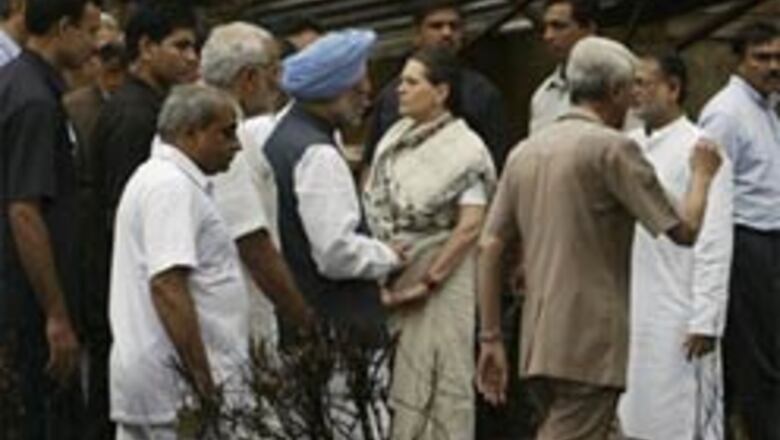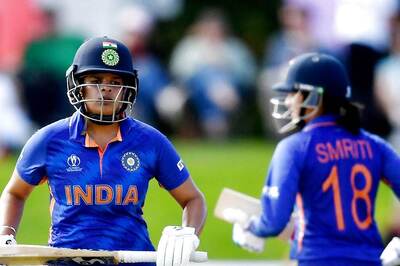
views
New Delhi/Mumbai: Do movies on terrorism really influence the psychology of the masterminds of terror? Could Saturday's heartless serial bombings in Ahmedabad, including in hospitals where the wounded were being rushed to, have been influenced by the recently released Hindi film Contract?
While the older generation argues that violent reality movies have an impact on the impressionable youth, others scoff at the idea that the terror masterminds behind the Ahmedabad bombings took a leaf out of Ram Gopal Verma's action thriller Contract.
In the movie, released on July 18, the villain Sultan plans to set off low-intensity blasts in crowded areas so that when the injured are rushed to the hospitals for first aid, they would trigger bigger explosions to maximise damage.
The Ahmedabad blasts followed the Contract plot very closely — a fact that even the police have reportedly admitted.
"I admit that the Ahmedabad blasts bear an uncanny resemblance with the way the villain plotted his acts of subversion in Contract. But movies are very different from reality. Any similarity is just a coincidence," Prashant Pandey, who wrote the script for Contract, told IANS from Mumbai.
The weeks leading to the blasts in Bangalore and Ahmedabad saw the release of two movies on terrorism — Contract and Mission Istanbul, directed by Apoorva Lakhia.
The latter took off on the al-Qaeda and the Osama bin Laden tapes that are aired with alarming regularity by the television channel Al Jazeera.
However, Pandey divulged that the nature of the blasts shown in the movie was not imagined. "They were based on events that happened in the Middle East long ago," he said.
Producer Pahlaj Nihalani feels it is preposterous to think that those who have triggered the blasts in Ahmedabad would have the time to watch Contract or any other movie.
Apoorva Lakhia, whose movie is strikingly similar to the way al-Qaeda operates, says, "Terrorism affects so many people on either side that you cannot say one party is right and the other wrong as long as both think they are correct in doing whatever they are doing."
Film critic Anupama Chopra feels it would be like passing a judgement if one is asked to comment on whether movies on terror end up inspiring radicals.
"It would be incorrect to say terrorists pick up from movies. There has to be a pre-disposition for violence. A person has to be involved in terrorist activity and only then can a movie trigger a chain of thought," Chopra told IANS.
"I can't imagine anyone watching a movie and then deciding to become a terrorist overnight," she said.
PAGE_BREAK
Nishikant Kamat's Mumbai Meri Jaan, that uses the July 2006 Mumbai suburban train bombings as its story board, touched many hearts in different ways.
The 2008 box-office can easily be billed as "terror special" with movies like "Hijack" inspired by the hijacking of an Indian airliner and Ruslaan, that depicts the fallout of the train blasts on a young Muslim, hitting the screens.
Even family soap opera maker Karan Johar has veered off his pet themes to make Khan, a movie about global terrorism that is still on the floor.
A random listing of the celluloid terror milestones in Bollywood over the last two decades throws up some popular favourites.
For instance, Black Friday that probed the 1993 Mumbai serial blasts and Sarfarosh starring Aamir Khan, which narrated the story of a young medic who quit college to join the Mumbai police after his three brothers died in a terror strike to chase a trans-border arms smuggling racket and a dreaded ISI agent.
Director Vidhu Vinod Chopra scored a hit with Mission Kashmir starring Hrithik Roshan, which traced the life story of Altaf, a young Muslim boy orphaned by terrorist attacks in Kashmir in the 90s, while Mani Ratnam set pulses racing with his poignant Dil Se, starring Shah Rukh Khan and Manisha Koirala in a tale of doomed love and terror involving a radio announcer and a beautiful suicide bomber.
Hollywood too has its share of coincidences.
A 1998 movie, The Siege, starring Denzel Washington and Annette Benning, which showed a realistic terrorist attack on New York City played itself out on September 11, 2001, when the city was bombed.
Bob de Graaff, a professor of terrorism and counter-terrorism at the Leiden University in the Netherlands, sees a link between terrorism and art.
National policy makers, warns the academic, should know about the young people's yearning for self-expression and their craving for "15 minutes of fame".
Since self-expression, according to Graaff, is an important aspect of terrorism, nations should pay more attention to the cultural manifestations in society and be more alert to "what's on air".
An 85-year-old veteran Mumbai-based actor, who refused to be named, regretted that some of the recent Hindi movies on crime and criminals had an adverse influence on the society.
"The film-makers makers let their imagination run wild. How can they conceive a scene showing blasts occurring at a hospital? This is not creative licence. It's stupidity," he fumed.















Comments
0 comment